Why Businesses Need Cloud Data Security?
You arrive at work on Monday morning to find your customer data leaked online. Financial records stolen. Business operations halted. The headlines are calling out your company’s name.
This happens daily. Businesses store everything in the cloud now, from customer records and financial data to staff and employee communications. But convenience comes with risk. One misconfigured folder or careless employee, and hackers walk right in.
Cloud Data Security acts as your shield. Let’s break down how it works and why your business can’t afford to ignore it.
What is Cloud Data Security?
Cloud data security is the strategy of protecting data in the cloud from threats like unauthorized access, data breaches, and insider threats. It combines technologies, policies, and processes to safeguard data throughout its lifecycle, whether at rest or in transit, across public, private, and hybrid cloud environments. This includes managing data on-premises or through third-party cloud service providers (CSPs).
How Cloud Data Security Works
Cloud and data security uses a mix of security layers:
1) Authentication & Access Control
Authentication ensures only verified users can access your cloud systems. Multi-factor authentication (MFA) adds a second checkpoint, like requiring both a password and a one-time code sent to a phone.
2) Cloud Security Tools
Tools like CASB platforms help enforce security policies across cloud applications. Cloud Access Security Broker solution secures your cloud apps, monitors access & prevents unauthorized activities.
3) Data Privacy Compliance
Compliance frameworks such as GDPR, DORA, ITAR, HIPAA, and SOC 2 ensure businesses handle sensitive personal information responsibly.
4) Continuous Monitoring & Threat Detection
Cloud security benefits include real-time monitoring for anomalies. For example, sudden large downloads, unusual login patterns, or attempts to bypass MFA can all indicate potential threats.
These methods work together to create a secure cloud data security program that keeps business-critical information protected.
Importance of Cloud Data Security for Businesses?
- Growing Cyber Threats
Hackers target cloud systems because that’s where the data lives. Cloud breaches are often more damaging due to centralized storage.
- Regulatory Compliance
Businesses in healthcare, finance, and retail face strict legal standards for data protection. Failing to comply can lead to heavy fines.
- Remote Work & SaaS Adoption
Employees access cloud applications from anywhere. Ensuring secure access is crucial when teams are distributed.
- Customer Trust
Customers expect their personal information to be safe. Breaches erode trust and harm your brand reputation.
Simply put: Without a strong cloud data security program, your business risks losing both data and trust.
Common Threats to Cloud Data Security
Cloud environments face unique security challenges. Here are some common cloud data security issues businesses encounter:
1. Data Breaches
Hackers may exploit weak passwords, misconfigured databases, or software vulnerabilities to gain unauthorized access to sensitive data.
2. Ransomware
Cybercriminals encrypt your files and demand payment for decryption. Cloud backups can help recover data without paying the ransom, but only if properly secured.
3. Insider Threats
Employees or contractors might misuse access, intentionally or accidentally. Monitoring access and enforcing least-privilege principles reduces this risk.
4. Misconfigurations
Incorrect settings in cloud storage or apps are a leading cause of accidental data exposure. Even a single misconfigured folder can leak sensitive information.
5. Endpoint Vulnerabilities
Laptops, phones, and tablets that connect to the cloud can be entry points for attackers. Endpoint security is critical for protecting data in hybrid environments.
Understanding these threats is the first step to protect cloud data more effectively.
Benefits of Cloud Data Security Protection
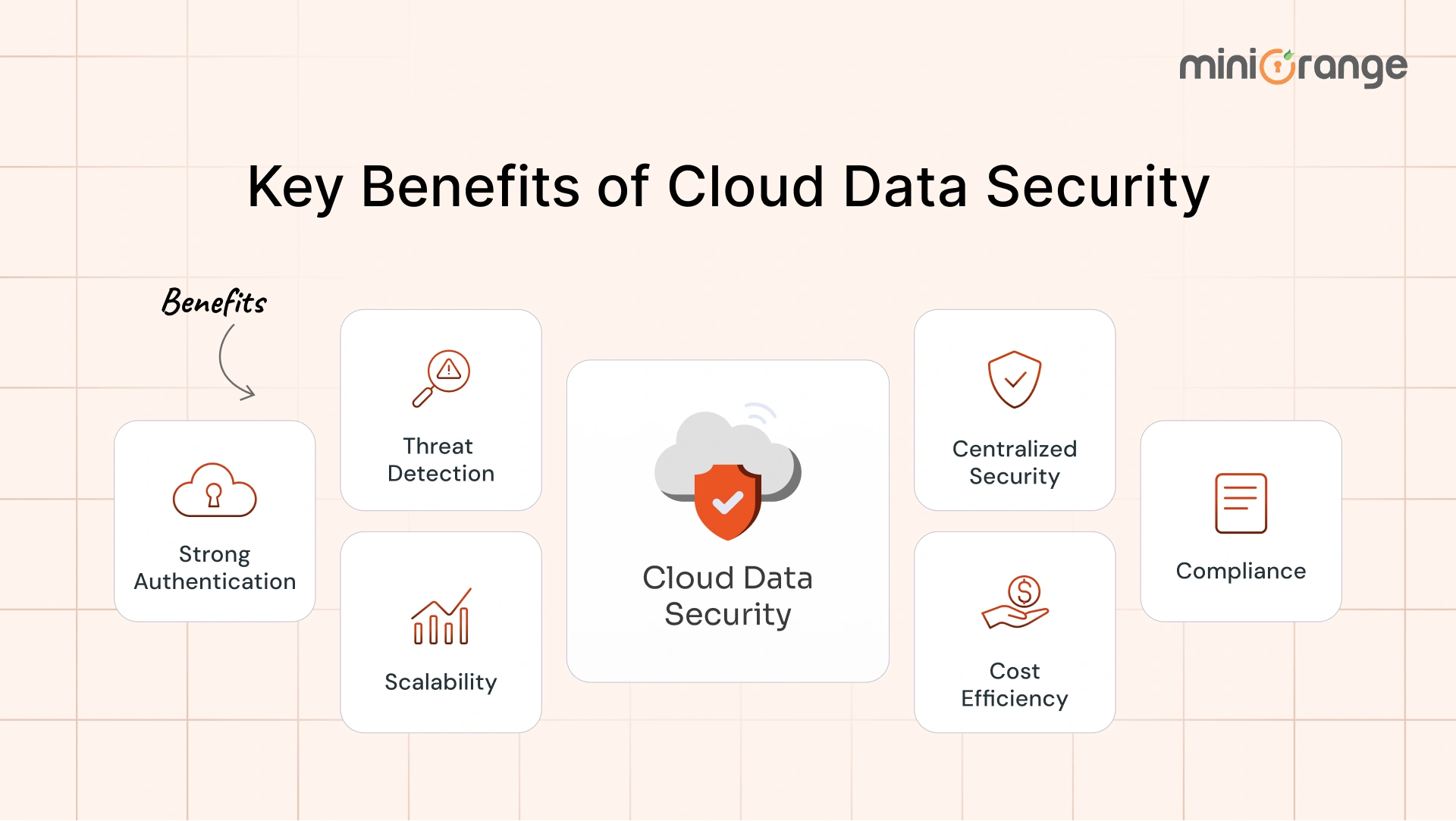
1. Compliance Readiness
Many industries have strict regulations to protect sensitive data. Healthcare, finance, retail, and tech companies must comply with standards like GDPR, DORA, ITAR, HIPAA, or SOC 2.
A robust cloud security program ensures that your business is always audit-ready.
2. Stronger Customer Trust
Customers expect businesses to protect their personal data. A single breach can damage reputations and erode customer confidence.
Example: An e-commerce platform that processes thousands of customer payments can build trust by implementing encryption, MFA, and CASB monitoring. Customers know their credit card details and personal information are safe, encouraging repeat purchases and loyalty.
Strong cloud security sends a clear signal: you value your customers’ privacy and take proactive measures to protect it.
3. Scalable Security
As your business grows, so does the amount of data you manage. Cloud security solutions scale with your needs, meaning you can protect more data and more users without extra complexity.
Scenario: A startup with 50 employees moves from on-premises servers to cloud apps as it grows to 500 employees. A cloud security program allows you to scale policies, enforce MFA, and monitor access without overloading your IT team.
This flexibility means businesses can expand operations globally while maintaining consistent security standards.
4. Reduced Financial Impact of Breaches
According to IBM’s 2023 Cost of a Data Breach Report, the average cost of a data breach is $4.45 million. Cloud security significantly reduces this risk by preventing unauthorized access and ensuring quick recovery.
Example: Without cloud security, a company could face not only ransom payments or recovery costs but also regulatory fines, legal fees, and lost business opportunities. Investing in cloud security upfront saves money and protects the bottom line in the long term.
5. Enhanced Employee Productivity
With proper cloud security, employees can work from anywhere without unnecessary restrictions. Policies enforced by CASB solutions and endpoint security ensure safe access while enabling collaboration.
Scenario: A sales team accesses cloud CRM data from a client site. Security measures like device checks, MFA, and encrypted connections allow them to work securely without IT intervention. Employees don’t have to waste time navigating cumbersome security processes, improving efficiency.
6. Competitive Advantage
Finally, strong cloud data security can be a differentiator. Companies that prioritize security inspire confidence with clients, partners, and investors.
Example: A B2B SaaS company that advertises its robust cloud security measures, including CASB monitoring and compliance certifications, is more likely to win contracts than a competitor with weaker security practices.
Investing in cloud data security is not just protective—it’s strategic.
With the right cloud data security solutions, businesses can secure data while enjoying the flexibility of cloud computing.
Best Practices for Implementing Cloud Data Security
1. Enable Strong Authentication
Passwords alone aren’t enough anymore. Multi-factor authentication (MFA) ensures that even if a password is compromised, unauthorized users cannot access your cloud systems.
Example: A finance manager logs in from a personal device. MFA sends a verification code to their phone. Even if someone steals the password, they cannot access the account without the second factor.
Tip: Use adaptive authentication where higher-risk logins (unusual location, device, or time) trigger additional verification steps. This adds another layer of protection without burdening employees unnecessarily.
2. Adopt a CASB Platform
A Cloud Access Security Broker (CASB) acts as a centralized security monitor across all cloud applications. It helps businesses control who can access what data, enforce security policies consistently across apps, and detect unusual behavior or potential breaches.
Pro Tip: Choose a CASB solution that provides real-time visibility, policy enforcement, and integration with your existing identity management systems.
3. Secure Endpoints
Endpoints like laptops, tablets, and smartphones are often the weakest links in cloud security. Without proper protection, they can become entry points for attackers.
Pro Tip: Treat every device that connects to the cloud as a potential risk. Centralized management tools can enforce security policies across all endpoints seamlessly.
4. Regular Audits
Cloud environments are dynamic, with constant updates, new users, and changing permissions. Regular audits help identify misconfigurations and vulnerabilities before they become security incidents.
Tip: Use automated audit tools and schedule periodic manual reviews. Track changes to user roles, permissions, and cloud app configurations to maintain continuous security oversight.
Final Thoughts
As more businesses embrace cloud platforms, cloud computing and data security must go hand in hand. From threats like ransomware to compliance requirements, organizations can’t afford to take shortcuts.
By implementing cloud data security best practices, investing in strong cloud data protection solutions, and leveraging tools like CASB platforms, businesses can protect sensitive data and build lasting trust with customers.
Ready to strengthen your cloud security? Explore the miniOrange Cloud Security Solutions today and take the first step towards a safer, smarter cloud environment.
Frequently Asked Questions (FAQs)
What Is Cloud Data Protection?
Cloud data protection is the process of securing information in cloud environments through encryption, backups, and access control to prevent loss or breaches.
Why Companies Need Cloud Data Security?
Businesses store critical information in the cloud. Without strong data security in cloud computing, they risk cyberattacks, compliance fines, and damaged customer trust.
Why should businesses store data in the cloud?
Cloud platforms offer scalability, flexibility, and cost savings. With the right cloud data privacy and security measures in place, businesses can enjoy these benefits without compromising protection.
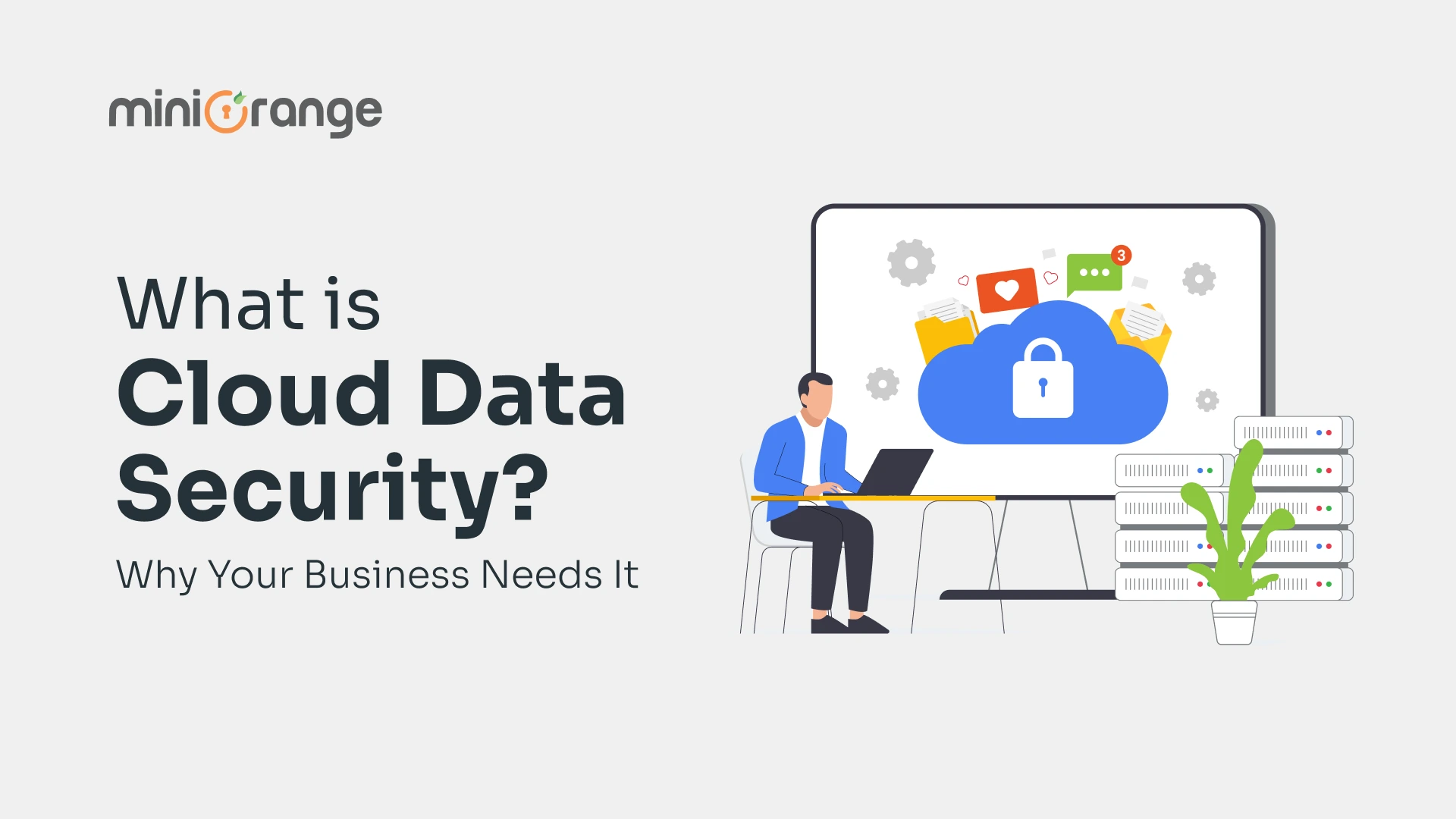



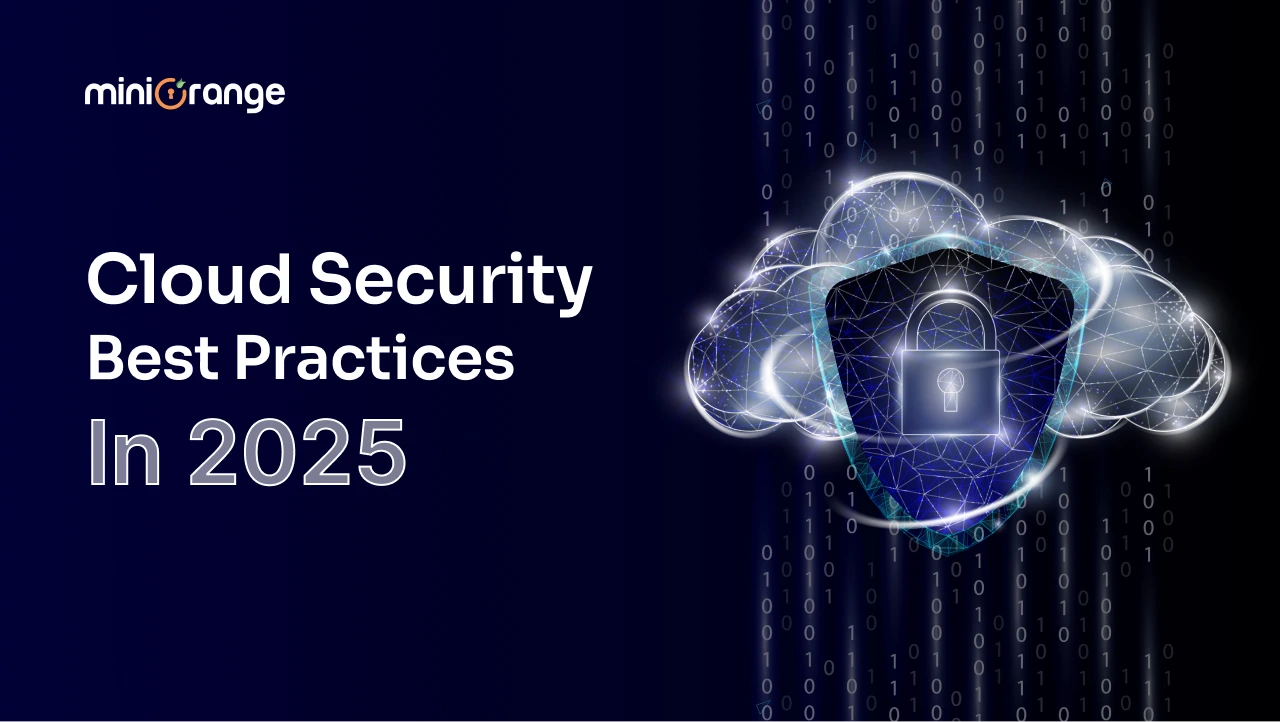
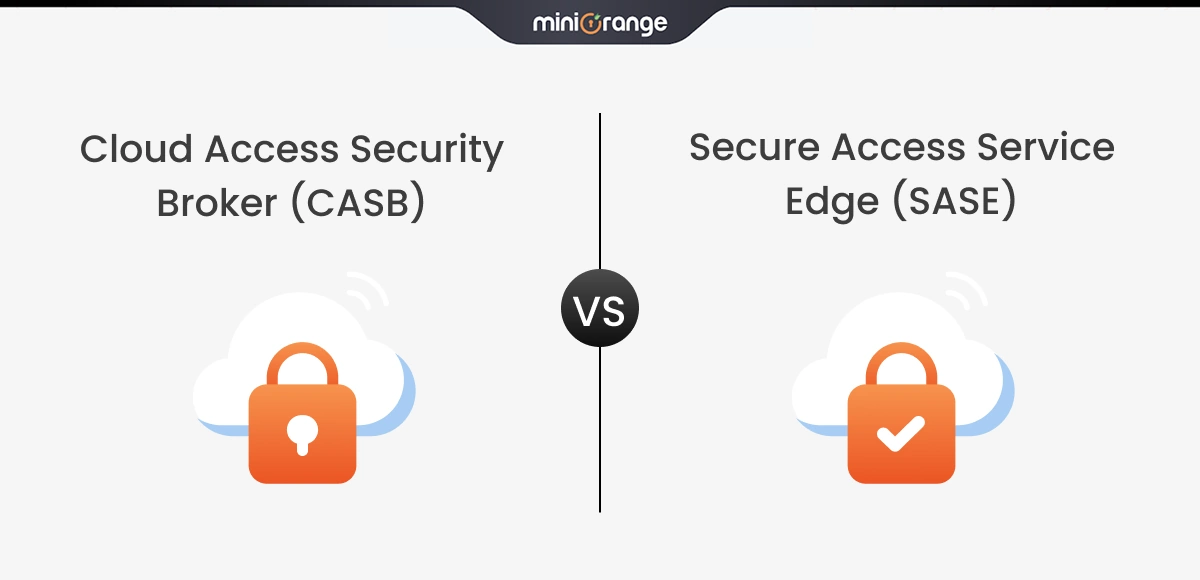
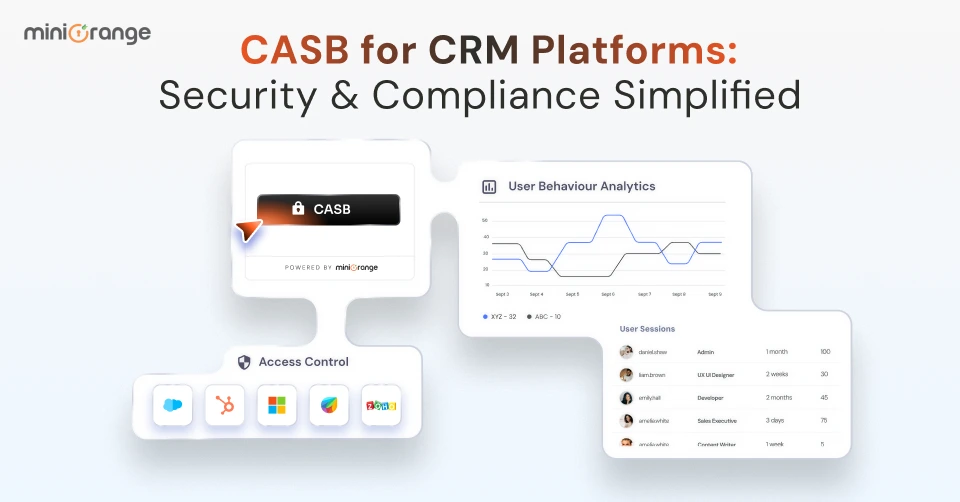

Leave a Comment